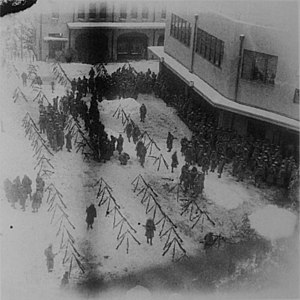Great Rectification
This article is incomplete because it is pending further input from participants, or it is a work-in-progress by one author. Please comment on this article's talk page to share your input, comments and questions. Note: To contribute to this article, you may need to seek help from the author(s) of this page. |
 Workers being herded out of their workplaces for "union inspection" | |
| Native name | |
|---|---|
| Date | March 21, 1954 – February 20, 1960 |
| Duration | 6 years |
| Location | Janpian Union of Revolutionary States |
| Also known as | The Great Correction, The Reign of Spider Lillies |
| Cause | Political instability, political rivalry, lack of strong or legitimate authority, realization of the Party-State concept |
| Motive | Political Repression, Consolidation of authority, fear of counter-revolutionaries, fear of foreign invasion or 5th columnists |
| Target | Perceived Counter-Revolutionaries, Rival Lorists, Dissidents, Revolutionary Council Members, Political Rivals, Party Members, Activists, Union Councilors |
| Deaths | Official Estimate:
|
The Great Rectification, also known as the Reign of Spider Lilies, was an early period in Janpian Union's history, following the victory of the All-Labor Union Party over Janpia and the subsequent establishment of the Janpian Union of Government Workers' Party. During this period, a series of mass arrests, executions, repressions, and political turmoil plagued the young Party-State, mainly owing to strong revolutionary fervor, accusations of being counter-revolutionary, and the lack of strong authority over the newly established Party, provided the near-anarchic political landscape that came as an aftermath of the Janpian Civil War.
The origin of the Great Rectification stems from different reasons. During the Janpian Civil War, the All-Labor Union Party, which is comprised of multiple pro-workers and lorist parties as well as collaborationist parties and groups, has united under the Union Pact to thwart off their common enemies such as the pro-monarchists, republicans, and non-labor groups. This in turn has temporarily halted certain ideological disputes during the war. However, following the All-Labor Union Party's victory from the civil war, these disputes would once again surface, this time in the functionaries of the newly established Janpian Union of Government Workers' Party. Another reason is that due to the ideal for a stateless society (WIP)

